Emphasizing the timely theme of "Energy and Innovation for Inclusive and Sustainable Development," the annual satellite seminar for the Sustainable Engineering Technology course was held for the 11th consecutive year on February 26 and 27, 2018. Eight groups of students presented diverse and innovative ideas inspired by this year's theme.
Prior to the satellite seminar, the students participated in a series of lectures in December 2017 and January 2018. These lectures were conducted by representatives of the Central Research Institute of Electric Power Industry (CRIEPI) on topics such as energy demand and energy saving, and NTT DoCoMo Inc. on their innovative projects in 5G technology and other fields. Students gained informative insight into these topics through discussions held with the speakers after their respective talks.
Day 1
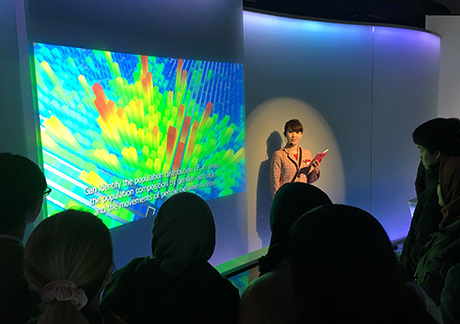
Demonstrations by DoCoMo R&D Center staff
The two-day satellite seminar started with a visit to the DoCoMo Research and Development Center located in the Yokosuka Research Park in Kanagawa Prefecture. After a short briefing about the center, students were provided with the exciting opportunity to visit the WHARF (Wealth, Human Activities and Revolution for the Future) exhibition hall, giving them a glimpse of what the future of mobile communication holds. The staff demonstrated many innovative and futuristic projects that they have been developing to facilitate smart lives of the future.
Some of the key technologies that were demonstrated included the use of mobile statistics for decision making, voice recognition applications that are capable of natural conversations with the user, bio-chip-equipped mobile phones which monitor user health, home appliances controlled by hand gestures, and Massive Multiple Input Multiple Output (MIMO) technology for 5G communication. After the demonstrations, students tested out some of these devices. Following the visit to WHARF, DoCoMo staff delivered informative demonstrations on green base stations that utilize solar power and on 5G technology, focusing particularly on Massive MIMO technology. A Q&A session concluded the site visit.

After the visit to DoCoMo R&D Center in Yokosuka
After the site visit, all participants moved to Hotel Maholova Minds in Miura City for the satellite seminar. After dinner, students introduced their countries and cultures to the rest of the participants. The group consisted of students and Teaching Assistants (TAs) from 18 countries. They talked about interesting and less-known facts about their countries and traditions, and some groups even came up with entertaining performances. Students raised questions to their colleagues, generating stimulating conversation and unique opportunities to enjoy the diversity. Following this discussion, students were up late into the night preparing and fine-tuning their presentations for following day.
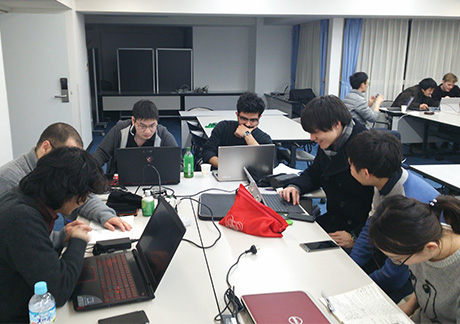
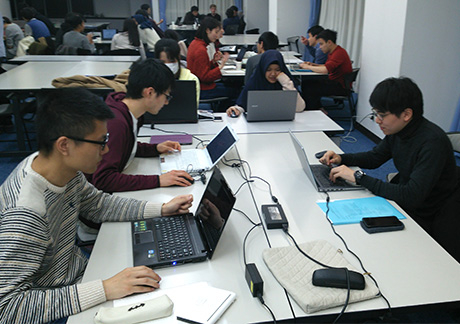
Late night preparations for seminar presentations
Day 2
On the 27th, the students presented their innovative energy-related proposals on how to realize inclusive and sustainable development to all the participants, including professors from Tokyo Tech and researcher representatives from DoCoMo. The groups addressed topics covering diverse disciplines and fields from innovative use of renewable energy for disaster recovery and minimizing the gap in quality of life caused by migration to energy recovery. Most importantly, the groups ensured that their proposed solutions were well in line with the theme of "Energy and Innovation for Inclusive and Sustainable Development". All presentations were informative and presented in enjoyable and interesting ways, triggering enthusiastic conversations and knowledge sharing during the Q&A sessions that followed each presentation.
Group No. |
Title |
1 |
Solar powered pump for inclusive and sustainable development - A case for Ciseuti village, Indonesia |
2 |
Food and groceries management application - Foodability |
3 |
Framework to reduce the gap in quality of life created by migration |
4 |
Utilities tracker application - Development of an utility use tracking system to increase awareness of people for sustainable energy use |
5 |
Integrated, multi-purposed vessel (IMPV) for accelerating recovery process in disaster areas |
6 |
The effect of the implementation of Microgrids – Urban and rural case study |
7 |
Waste heat : From zero to hero |
8 |
Innovative wind power in Japan |
After the presentations, Professor Shinya Hanaoka, chair of the Sustainable Engineering Program, and a representative from DoCoMo acknowledged the students' creative proposals and presentation skills. The best three presentations and best discussion participants were awarded with certificates. Groups 8, 6, and 5 took 1st, 2nd and 3rd places respectively.
-
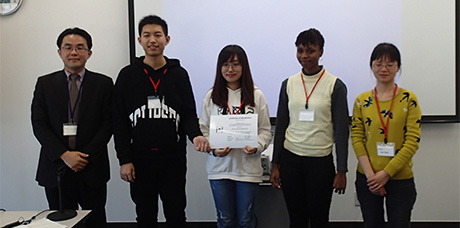
1st Place: Group 8
-
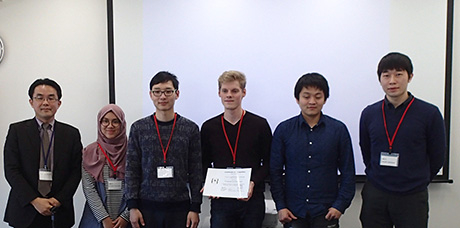
2nd Place: Group 6
-
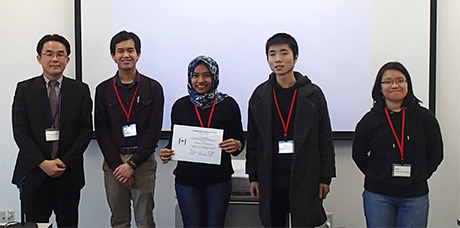
3rd Place: Group 5
Winners of the best presentation awards
. Any information published on this site will be valid in relation to Science Tokyo.









